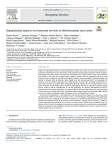Bruno D., Sorando R., Alvarez-Farizo B., Castellano C., Céspedes V., Gallardo B., Jiménez J.J., López M.V., Lopez-Flores R., Moret-Fernandez D., Navarro E., Picazo F., Sevilla-Callejo M., Tormo J., Vidal-Macua J.J., Nicolau J.M., Comin F.A. (2021). Depopulation impacts on ecosystem services in Mediterranean rural areas. Ecosystem Services, 01/12/2021, vol. 52, p. 1-11.
https://doi.org/10.1016/j.ecoser.2021.101369
https://doi.org/10.1016/j.ecoser.2021.101369
| Titre : | Depopulation impacts on ecosystem services in Mediterranean rural areas (2021) |
| Auteurs : | D. Bruno ; R. Sorando ; B. Alvarez-Farizo ; C. Castellano ; V. Céspedes ; B. Gallardo ; J.J. Jiménez ; M.V. López ; R. Lopez-Flores ; D. Moret-Fernandez ; E. Navarro ; F. Picazo ; M. Sevilla-Callejo ; J. Tormo ; J.J. Vidal-Macua ; J.M. Nicolau ; F.A. Comin |
| Type de document : | Article |
| Dans : | Ecosystem Services (vol. 52, December 2021) |
| Article en page(s) : | p. 1-11 |
| Langues : | Anglais |
| Langues du résumé : | Anglais |
| Catégories : |
Catégories principales 05 - DEVELOPPEMENT RURAL ; 5.1 - DéveloppementThésaurus IAMM SECTEUR AGRICOLE ; SERVICE ECOSYSTEMIQUE ; DEPOPULATION ; EXODE RURAL ; INTENSIFICATION ; GESTION DE L'ENVIRONNEMENT ; UTILISATION DES TERRES ; ANALYSE DEMOGRAPHIQUE ; ZONE RURALE ; REGION MEDITERRANEENNE ; ESPAGNE ; ARAGON |
| Résumé : | Despite the exponential increase in human population at global scale, some rural areas have experienced a progressive abandonment over the last decades. Under particular socioecological and policy contexts, changes in demography may promote land-use changes and, consequently, alter ecosystem services (ES) supply. However, most studies on this topic have targeted urban population increase, whereas depopulation has been rarely addressed. Here, we examined how shifts in demographic variables (human population, population density, and number of villages) affect provisioning (water supply, food and biomass production) and regulating (soil retention, water and nutrient regulation) ES in Mediterranean rural areas with contrasting environmental, socioeconomic and land-use contexts. When depopulation results in underuse of socio-ecological systems, we expected a decrease of provisioning and an increase of regulating ES, whereas we expected the opposite pattern when it results in land-use intensification. To test this hypothesis, we compared demographic data and ES estimated with Soil and Water Assessment Tool (SWAT) linked to land-use changes between the 1950s and 2000s in three rural areas of Aragón (NE Spain). Generalized Additive Mixed Models and Linear Mixed-Effect Models were used to analyze demographic trends, ES changes and the relationship between them. We found severe depopulation (−42% inhabitants) and associated land-use changes in the three areas, which was particularly evident in isolated mountainous zones (−63% inhabitants). Depopulation trends significantly affected land use and, consequently, all of the ES evaluated. In mountainous depopulated areas, land abandonment and rewilding resulted in the increase in water regulation (>1000%) and soil retention (>400%). In contrast, agriculture was intensified in more fertile and easy-to-access lowland areas, boosting the food production service (>600%). Accordingly, the interactions among depopulation, crop production and regulating ES should be considered in the management schemes and policies targeting rural areas for a balanced and sustainable supply of ES in the long term. |
| Cote : | En ligne |
| URL / DOI : | https://doi.org/10.1016/j.ecoser.2021.101369 |







